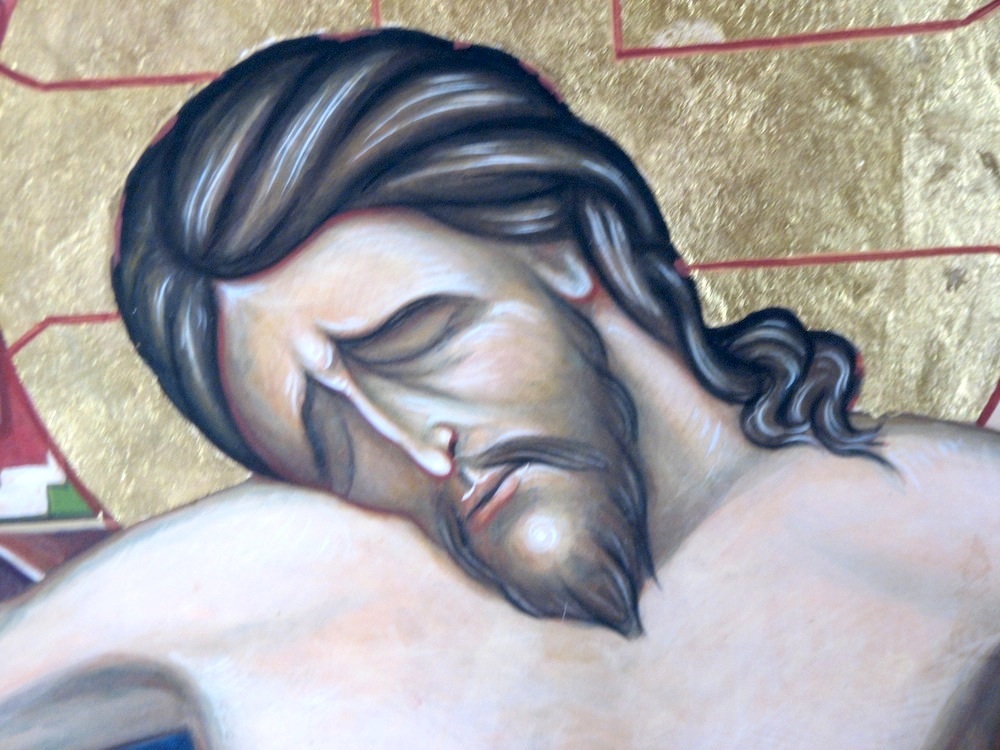 The Church sets aside the next forty days as a period of prayer and penance as a preparation for the Great and Holy Week and the resurrection of our Lord. There are rules about fasting, which we must observe as faithful Christians. However, we must not mistake the true meaning of the Fast. The fast is, truly, a period of spiritual ascesis (struggle), as today’s Gospel tells, us, “Do not store up for yourselves treasures on earth … But store up treasures in heaven” (Matthew 6:19-20). However, it is not like school, where we keep all the class rules and earn gold stars for our obedience. Today’s epistle tells us that the Fast is not about “keeping rules:” “The one who eats must not despise the one who abstains, and the one who abstains must not pass judgment on the one who eats; for God has welcomed him” (Romans 14:3). Yes, we do keep the rules, but we must also transcend the rules.
The Church sets aside the next forty days as a period of prayer and penance as a preparation for the Great and Holy Week and the resurrection of our Lord. There are rules about fasting, which we must observe as faithful Christians. However, we must not mistake the true meaning of the Fast. The fast is, truly, a period of spiritual ascesis (struggle), as today’s Gospel tells, us, “Do not store up for yourselves treasures on earth … But store up treasures in heaven” (Matthew 6:19-20). However, it is not like school, where we keep all the class rules and earn gold stars for our obedience. Today’s epistle tells us that the Fast is not about “keeping rules:” “The one who eats must not despise the one who abstains, and the one who abstains must not pass judgment on the one who eats; for God has welcomed him” (Romans 14:3). Yes, we do keep the rules, but we must also transcend the rules.
The Great Fast is not a period of earning merit points, which leads to pride anyway, but it is a time for a spiritual revolution in our lives. We must turn the values of the world: love for power, love of money, love of pleasure, and self-serving upside down. In our baptism, we promised to renounce “Satan, and all his works, and all his angels and all his service, and all his pride,” and to commit ourselves to Christ. This is especially true in a world which polarizes us into self-righteousness and teaches us hatred for the other. Why, indeed, do we fast? It is to bring about this revolution, foretold by Mary, the Mother of God, “[God] has thrown down the rulers from their thrones but lifted up the lowly. The hungry he has filled with good things; the rich he has sent away empty” Luke 1:52-53).
We must become the humble, the lowly, the hungry and reject the world’s lust for power. In the Great Fast, then, we live out the Lord’s Prayer: “Thy Kingdom come, thy will be done on earth as it is in heaven,” not our own plan for salvation, but God’s plan, God’s will, seen in love for the other, “Give us this day our daily bread,” for we fast from the delightful food of this world, to receive only Christ, who said, “I am the bread of life (John 6:48);” “forgive us our trespasses, as we forgive those who trespass against us,” in unconditional forgiveness, as today’s Gospel reveals, “If you forgive others their transgressions, your heavenly Father will forgive you. But if you do not forgive others, neither will your Father forgive your transgressions (Matthew 6:14-15), and finally, “lead us not into temptation, but deliver us from evil,” for if in the Fast we imitate Jesus, who fasted in the desert for forty days to overcome temptation, then we too will be delivered from evil, but not by our own proud struggles, but by the grace of God. In this fast, we must open ourselves to Christ, who said, “Behold, I make all things new” (Revelation 21:5).
Meditation by Archpriest David Petras
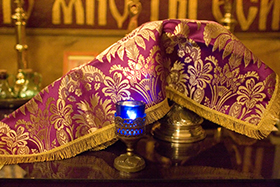 Tonight, March 13th, Father Iura will serve the Divine Liturgy of the Pre-sanctified Gifts at 7:00 p.m.
Tonight, March 13th, Father Iura will serve the Divine Liturgy of the Pre-sanctified Gifts at 7:00 p.m. Tonight, March 13th, Father Iura will serve the Divine Liturgy of the Pre-sanctified Gifts at 7:00 p.m.
Tonight, March 13th, Father Iura will serve the Divine Liturgy of the Pre-sanctified Gifts at 7:00 p.m.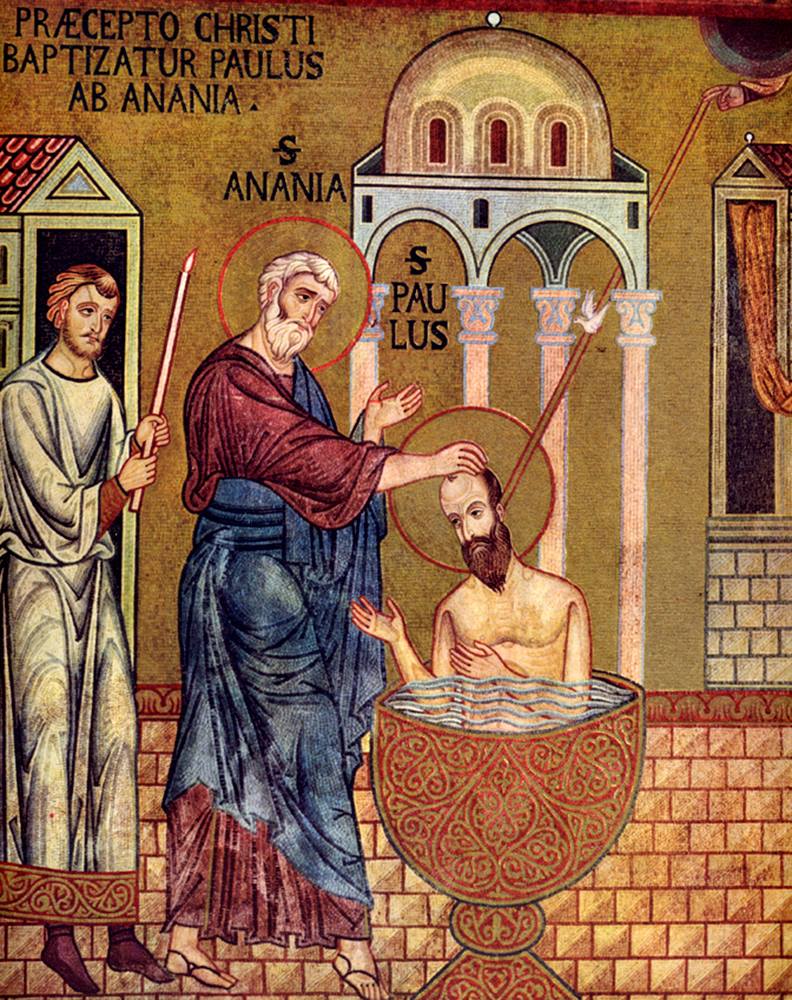 What does it mean to be a Christian, a follower of Christ? The stichera today remind us of our life in Christ in the holy sacramental mysteries. We anoint ourselves, when chrismated with “the seal of the gift of the Holy Spirit,” but this means virtue. We are baptized, washed with the consecrated water, but it is the water of purity. We are partakers of the Lamb of God, we partake of the sacrifice, we partake of the resurrection, but this is “the brightness of virtue and the goodness of our deeds.” Yes! We need to fast, to deny ourselves, but the fasting itself is not the goal, but our transformation by God’s love into a people that is holy and pure and good.
What does it mean to be a Christian, a follower of Christ? The stichera today remind us of our life in Christ in the holy sacramental mysteries. We anoint ourselves, when chrismated with “the seal of the gift of the Holy Spirit,” but this means virtue. We are baptized, washed with the consecrated water, but it is the water of purity. We are partakers of the Lamb of God, we partake of the sacrifice, we partake of the resurrection, but this is “the brightness of virtue and the goodness of our deeds.” Yes! We need to fast, to deny ourselves, but the fasting itself is not the goal, but our transformation by God’s love into a people that is holy and pure and good. The Church sets aside the next forty days as a period of prayer and penance as a preparation for the Great and Holy Week and the resurrection of our Lord. There are rules about fasting, which we must observe as faithful Christians. However, we must not mistake the true meaning of the Fast. The fast is, truly, a period of spiritual ascesis (struggle), as today’s Gospel tells, us, “Do not store up for yourselves treasures on earth … But store up treasures in heaven” (Matthew 6:19-20). However, it is not like school, where we keep all the class rules and earn gold stars for our obedience. Today’s epistle tells us that the Fast is not about “keeping rules:” “The one who eats must not despise the one who abstains, and the one who abstains must not pass judgment on the one who eats; for God has welcomed him” (Romans 14:3). Yes, we do keep the rules, but we must also transcend the rules.
The Church sets aside the next forty days as a period of prayer and penance as a preparation for the Great and Holy Week and the resurrection of our Lord. There are rules about fasting, which we must observe as faithful Christians. However, we must not mistake the true meaning of the Fast. The fast is, truly, a period of spiritual ascesis (struggle), as today’s Gospel tells, us, “Do not store up for yourselves treasures on earth … But store up treasures in heaven” (Matthew 6:19-20). However, it is not like school, where we keep all the class rules and earn gold stars for our obedience. Today’s epistle tells us that the Fast is not about “keeping rules:” “The one who eats must not despise the one who abstains, and the one who abstains must not pass judgment on the one who eats; for God has welcomed him” (Romans 14:3). Yes, we do keep the rules, but we must also transcend the rules.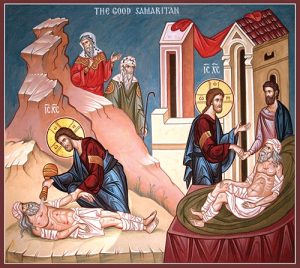 Matins
Matins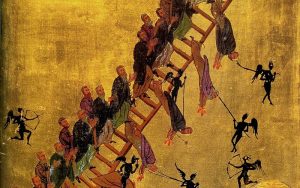 Fourth Sunday of the Great Fast: Commemoration of our Holy Father John of the Ladder
Fourth Sunday of the Great Fast: Commemoration of our Holy Father John of the Ladder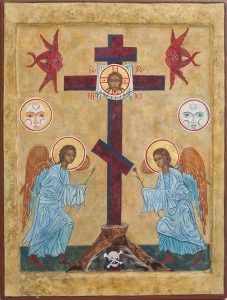 The first half of the Great Fast tells us the stories of Adam and Eve and their children, and the flood of Noah. It is a story of the creation of a perfect world and how that has been marred by human sin. It tells of the end of paradise, “The Lord God therefore banished him from the garden of Eden, to till the ground from which he had been taken. He expelled the man, stationing the cherubim and the fiery revolving sword east of the garden of Eden, to guard the way to the tree of life” (Genesis 3:23-24).
The first half of the Great Fast tells us the stories of Adam and Eve and their children, and the flood of Noah. It is a story of the creation of a perfect world and how that has been marred by human sin. It tells of the end of paradise, “The Lord God therefore banished him from the garden of Eden, to till the ground from which he had been taken. He expelled the man, stationing the cherubim and the fiery revolving sword east of the garden of Eden, to guard the way to the tree of life” (Genesis 3:23-24).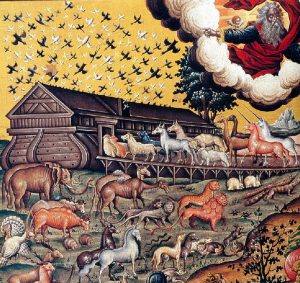 One the key parts of the Great Fast is attending to Baptism. Do we realize the import of Baptism and its roots?
One the key parts of the Great Fast is attending to Baptism. Do we realize the import of Baptism and its roots?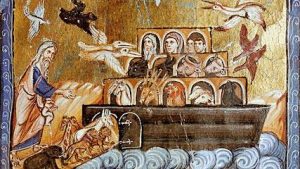 During this week, at Vespers, we read the story of the flood and the salvation of the righteous man Noah and his family. At first, this might seem to be the dark side of God, and on Friday, we heard: “When the Lord saw how great the wickedness of human beings was on earth, and how every desire that their heart conceived was always nothing but evil, the Lord regretted making human beings on the earth, and his heart was grieved. So the Lord said: I will wipe out from the earth the human beings I have created, and not only the human beings, but also the animals and the crawling things and the birds of the air, for I regret that I made them.” The story of the flood may have some historical basis, as a great flood in the Mediterranean basin in pre-history, but the story is iconic. (Noah could not have brought all the animal species on the ark.) The story tells us that the “wages of sin is death” (Romans 6:23).
During this week, at Vespers, we read the story of the flood and the salvation of the righteous man Noah and his family. At first, this might seem to be the dark side of God, and on Friday, we heard: “When the Lord saw how great the wickedness of human beings was on earth, and how every desire that their heart conceived was always nothing but evil, the Lord regretted making human beings on the earth, and his heart was grieved. So the Lord said: I will wipe out from the earth the human beings I have created, and not only the human beings, but also the animals and the crawling things and the birds of the air, for I regret that I made them.” The story of the flood may have some historical basis, as a great flood in the Mediterranean basin in pre-history, but the story is iconic. (Noah could not have brought all the animal species on the ark.) The story tells us that the “wages of sin is death” (Romans 6:23).